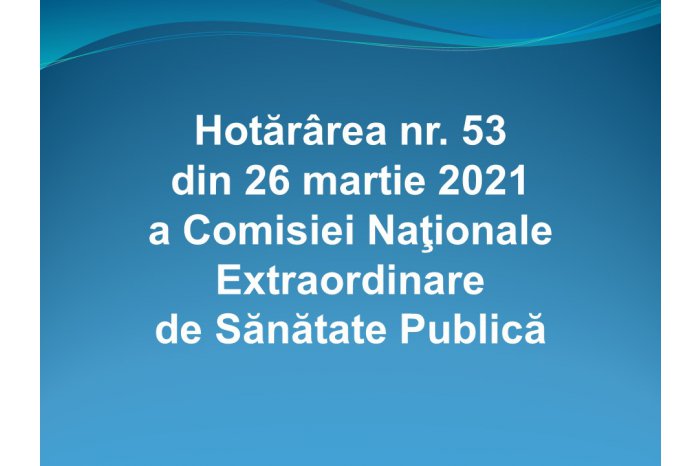Decision No 53 of Moldova's National Extraordinary Public Health Commission from 26 March 2021
20:33 | 26.03.2021 Category: Official
Chisinau, 26 March /MOLDPRES/ -Under the Article 58 from the Law No 10/2009 on the state supervision of the public health sector (Official Journal, 2009, No 67, Article 183), with the subsequent amendments, of the provisions of the Decision No 51 of the National Extraordinary Public Health Commission (CNESP),
as a result of the analysis of the evolution of the epidemiological situation nationally and internationally and ascertaining the tendencies of the further worsening of the epidemic process of infection with COVID-19 in Moldova,
to establish the measures necessary for preventing the spread of the COVID-19 infection during the emergency state in the public health sector and to ensure the carrying out of the activity of the religious cults in better conditions of anti-epidemic security,
CNESP
DECIDES:
1. During the emergency state in the public health sector, the activity of the religious cults, which deals with the organization of religious meetings, the officiating of services and prayers with more people together or in private, of religious services and other traditional religious events will be able to be held inside and/or outside the churches, with the observance of the following measures of prevention and control of the COVID-19 infection:
1.1. Inside the churches, the access of a limited number of persons is allowed, so that an area of at least 4 square metres is ensured for each person and a safety distance of at least 2 metres between the people participating in the religious activities (excepting the clergymen). The flow of people will be guided, so that the formation of agglomerations is avoided. The clergymen will ensure the strict observance of the provisions of this sub-point by all people entering the churches.
1.2. The setting of dispensers with disinfectant solutions based on alcohol for observing the hands’ hygiene in visible and accessible places at the entrance into churches. Each person is obliged to disinfect his/her hands at the entrance into the church and in the place of organizing the religious services.
1.3. Carrying out of the observational sorting and measuring of the body temperature of each person at the entrance into the church, with denying the access inside for people having symptoms of respiratory infection (cough, sneeze, rhinorrhea) or fever and informing them about the need to consult a physician.
1.4. Compulsory wearing of the protection mask during the entire period of stay in the church. The mask must cover both the mouth and the nose.
1.5. Placement, in visible place, of written notices as to the rules of physical distancing, avoiding of agglomerations, limited access to churches and in the places of the religious services’ organization (including the maximally allowed number of people staying concomitantly in the church), as well as about the compulsoriness of the correct wearing of the protection mask, observance of the hands’ hygiene and cough and sneeze etiquette. The clergymen will monitor the observance by the people from inside the churches of the rules established.
1.6. Monitoring the health condition of the clergymen, including by measuring the body temperature at the beginning and at the end of the working day. If symptoms specific to the acute respiratory infection (cough, sneeze, rhinorrhea) are detected, the person must not be allowed to the officiating of services, he/she is self-isolated and the family physician is informed.
1.7. Avoiding the contact and kissing of cult objects.
1.8. Non-allowing the consumption of food products, including providing them, inside the churches.
1.9. Promoting the greeting between believers and clergymen exclusively by bowing the head, without embraces.
1.10. The blessing will be offered/received from a distance of at least one metre.
1.11. The objects and the frequent contact surfaces (for substance, doors’ handles, balustrades, chairs, etc.) will be periodically disinfected, once in 3-4 hours.
1.12. Urging the people from the risk groups, elderly people and people with chronic diseases to avoid agglomerated places and making the prayers at home.
1.13. Avoiding the organization of pilgrimages.
1.14. The religious activities officiated by clergymen in open air will be held with the maintaining of the physical distance of 1.5 metres between people.
1.15. The religious activities held in public spaces, outside the churches, are not regarded as mass rallies.
2. The decisions of the National Extraordinary Public Health Commission are executory for the central and local public administration authorities, for private people and legal entities, no matter the activity sector and the legal form of organization.
3. The territorial extraordinary public health commissions will ensure the revision of all decisions/instructions approved, bringing them in line with CNESP’s decisions.
4. CNESP asks media representatives to inform the public about the provisions of this decision, as well as about need to strictly observe the measures of prevention and control of the COVID-19 infection.
5. The non-observance of the public health measures, set forth in the present Decision, represents danger for the public health and will serve as reason for calling the guilty people to contravention/criminal account.
6. The present decision enters into force at the moment of its issuance and is published on the Government’s official webpage.
Chairman of the Commission, acting Prime Minister Aureliu Ciocoi
Deputy chairman of the Commission Health, State Secretary at the Labour and Social Protection Minister Igor Curov
Secretary of the Commission, acting director of the National Public Health Agency Vasile Gustiuc

